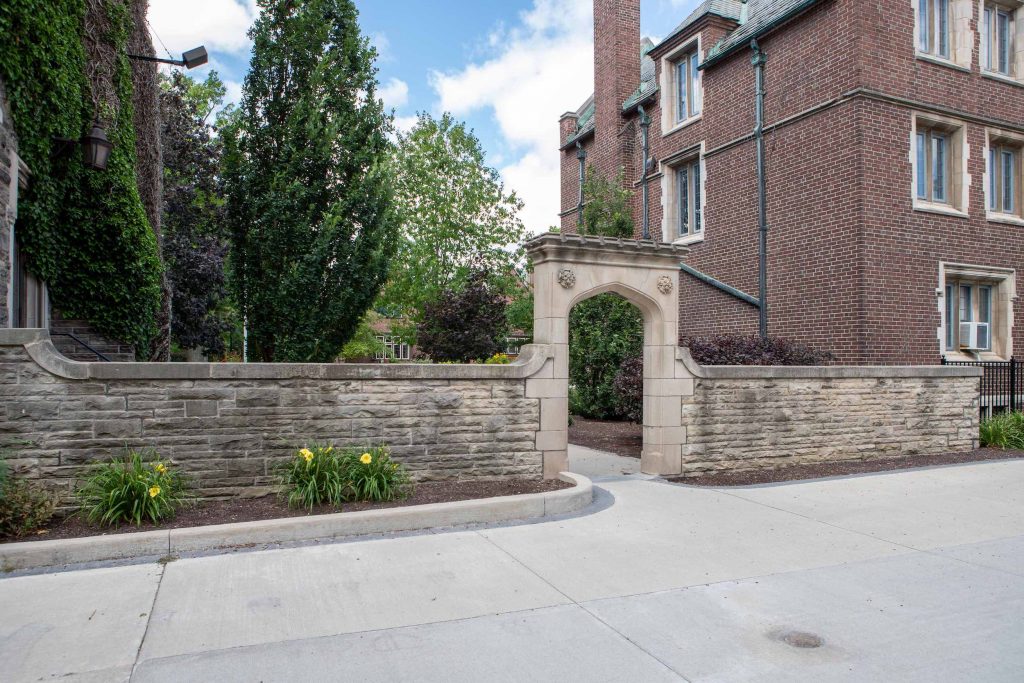Committed to Sustainability-Centered Education
At McMaster, our commitment to education about the UN Sustainable Development Goals is woven throughout courses in all faculties, in our public programming and events, and community engagement activities.
Meaningful SDG Education Across the Curriculum
McMaster University is committed to integrating the UN Sustainable Development Goals (SDGs) across its courses, ensuring that students from all faculties are equipped with the knowledge and skills needed to address global challenges. With 42% of graduate and undergraduate courses embedded with SDG education, McMaster is actively aligning its teaching with its mission to serve the social, cultural, and economic needs of our community and society.
The focus on SDGs related to health and wellbeing (SDG 3 – 14% of undergraduate courses), inequality (SDG 10 – 15% of undergraduate courses), and peace, justice, and strong institutions (SDG 16 – 11% of undergraduate courses) highlights McMaster’s dedication to fostering an environment where academic learning meets societal needs. This approach resonates with the university’s mission to nurture creativity, innovation, and excellence, aiming to empower students to make meaningful contributions to society.
For the undergraduate class of 2025, 93% of graduands would have enrolled in at least one course that actively promotes SDGs. This highlights our students’ interest in addressing global sustainability challenges and provides a solid foundation for advancing our commitment to sustainability and education.
The emphasis on inclusive excellence, community engagement, and interdisciplinary learning showcases McMaster’s strategy to create a learning experience centered around fostering collective well-being and societal impact. By recognizing the SDGs within the curriculum, McMaster is setting the stage for students and faculty to collaborate on innovative solutions to pressing local, national, and global issues.

Dedicated SDG Education
McMaster’s Academic Sustainability Programs Office is a central resource for many of the innovative educational programs offered at the undergraduate and graduate level, including the Interdisciplinary Minor in Sustainability, the project-based Sustainable Future Program and the Sustainability Internship Program that enables all students to apply their knowledge about sustainability to address real-world problems.
Academic Sustainability Programs Office
McMaster University provides all our students with the opportunity to take part in interdisciplinary, student-led, community-based, experiential learning focused on sustainability and the SDGs. The Academic Sustainability Programs Office is the central resource for many of these innovative programs offered at the undergraduate and graduate level. More than 70 courses from faculties across campus are offered as part of McMaster’s Interdisciplinary Minor in Sustainability.
Programs provided by the Academic Sustainability Programs Office:
- Sustainable Future Program (SUSTAIN): McMaster’s Sustainable Futures Program is a suite of eight undergraduate courses focused on sustainability, open to students from all faculties. These courses engage students in meaningful, experiential research and foster opportunities to place local action within a global context. More than 800 students from all faculties have enrolled in this program to date. The three newest courses offered include: Advocating for Sustainability, Exploring the Sustainable Development Goals, and Intersectionality and Sustainable Development.
- Students are encouraged to think up these bold ideas and are taught how to put them into action through a McMaster SUSTAIN course exploring the SDGs.
- The Sustainability Internship Program: Undergraduate students develop and implement a real-world sustainability project and receive course credit from their home faculty upon successful completion.
- Interdisciplinary Minor in Sustainability: Students choose from a list of sustainability courses from faculties across campus and tailor a minor to complement their undergraduate degree and education.
- Graduate/Undergraduate Collaboration in Experiential Learning: Graduate students work in collaboration with undergraduates to develop and implement a real-world sustainability project and receive academic recognition upon successful completion.
- Community Engagement: An opportunity for enrolled students to work with members of the McMaster and broader communities to tackle a real-world sustainability project.
Interdisciplinary Minor in Sustainability
Addressing sustainability in our society posts complex challenges that require interdisciplinary solutions. McMaster created the Interdisciplinary Minor in Sustainability with the goal of developing students’ interdisciplinary knowledge and understanding of sustainability. The scope and definition of sustainability used for the Minor are guided jointly by the United Nations Sustainable Development Goals and the Association for the Advancement of Sustainability in Higher Education (AASHE). In selecting our course list we have adopted AASHE’s definitions below:
To count as sustainability-focused, the course title or description must indicate a primary and explicit focus on sustainability as defined by the UN SDGs. This includes:
- Foundational courses with a primary and explicit focus on sustainability (e.g., Introduction to Sustainability, Sustainable Development, Sustainability Science)
- Courses with a primary and explicit focus on the application of sustainability within a field (e.g., Architecture for Sustainability, Green Chemistry, Sustainable Agriculture, Sustainable Business).
- As sustainability is an interdisciplinary topic, such courses generally incorporate insights from multiple disciplines.
- Courses with a primary and explicit focus on a major sustainability challenge (e.g., Climate Change Science, Environmental Justice, Global Poverty and Development, Renewable Energy Policy). The focus of such courses might be on providing knowledge and understanding of the problems and/or the tools for solving them.
The course title or description does not have to use the term “sustainability” to count as sustainability-focused if the primary and explicit focus of the course is on the interdependence of ecological and social/economic systems or a major sustainability challenge. If the course title and description do not unequivocally indicate such a focus, but it is evident from the course description or syllabus that the course incorporates sustainability challenges, issues, and concepts in a prominent way, the course may qualify as ‘sustainability-inclusive’.

